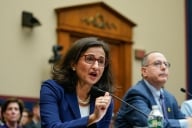You have /5 articles left.
Sign up for a free account or log in.
The prediction that China’s economy is heading for a major melt-down is starting to have a substantial effect on its academy. Estimates of the country’s debt – that is debt that is basically unrecoverable – range from $1.75 trillion to $3.5 trillion, and even the lesser figure is larger than the total amount of capital in the banking system—around $1.5 trillion. No Chinese banker is admitting to the impending crisis, a strategy learned from the US system, that also kept its trouble secret for as long as possible. Just in case you’re thinking that things can’t be that bad, just bear in mind that current level of private debt in China is running at over 200 per cent of GDP. And then if you add the probability that the collusion and corruption that added to the chaos in the US is magnified in China, a feeling of inevitability ensues. Richard Vague outlines the problem in detail in a paper called The Coming Crisis in China published in Democracy, A Journal of Ideas.
China, moves between seeing universities as essential and seeing them as peripheral. When times are good, universities are well funded and play a large part in public and private discourse. When times are bad, their funding is reduced, free-thinking is discouraged and performance is measured solely in terms of productivity. If you want to keep secrets, the last thing you would support is an unrestrained academy. With an impending financial crisis more threatening than smog around the corner, it is time to reign in criticism of the government.
A few months ago, Education Minister, Yuan Guiren, urged universities in the country to shun “textbooks promoting western values”. In his address to university heads, Mr Yuan said that staff should not make any remarks critical of the Communist Party of China (CPC), or even of socialism as an ideology. A colleague tells me that Mr Yuan didn’t smile when he said that lecturers should be “positive” and adhere to the “political, legal and moral bottom line”. This would be laughable if academics like Xia Yeliang from Peking University hadn’t recently been sacked after calling for democratic reforms or if Ilham Tohti hadn’t been imprisoned for life after urging dialogue between Beijing and the Uighur minorities.
President Xi Jiping, late last year urged universities to be “socialist universities with Chinese characteristics”. Part of the problem with that ambition is that university students are rarely from the proletariat masses, and most often from the rising middle classes, a trend that contributes to an increasingly divided society. Fundamentally (but not exactly) it was the same problem that Chairman Mao ran into when he called on universities to ensure that graduates were “both red and expert”. It didn’t work, and Mao resorted to publicly belittling the academy and all who worked in it. The last thing President Xi wants is to belittle the Chinese universities considering that he and his predecessors have worked so hard on building international stature for the country’s institutions and turning them into idea and innovation factories. It’s simply a campaign to get everyone to see that intellectual freedom does flow into politics.
“Under the Dome”, the documentary about pollution in China (not the TV series based on Stephen King’s novel) was removed from China’s social media, including WeiBo, after a week or so but by then tens of millions of Chinese people had already seen it. Initially the government was okay with it, comparing it to “Silent Spring”, the documentary that exposed the USA’s environmental mismanagement, but the critical tone of the expose soon had officials in an uproar and it was shut down. Actually, Under the Dome was not so much like Silent Spring as it was like “Inside Job”, the 2010 documentary about corruption in the US, in that it revealed deliberate illegal activity at the federal, corporate, administrative and personal levels that not only went unpunished, but in most cases was rewarded. It named names and provided evidence, but nothing changed and even won an Oscar. Most of the “cast” got jobs as economic advisors to Obama or positions at leading US universities or corporations. US banks ducked, weaved and then went on as before. Now, THAT is adhering to the political, legal and moral bottom line.
Weathering the coming storm will be made much easier if China can control its academics. On the one hand, campuses are unlikely to be shut down, even if funding levels will continue to fall and be more targeted towards product-focused research (not unlike any other country facing belt-tightening). On the other, spinning these hardships positively will depend on non-critical commentary from all public voices. There will be only one hymn sheet and agitating for reform, pushing freedom of speech, being innovative and creative, is not part of the tune.
One of my Chinese colleagues and I have a running joke about “the man on the Clapham bus” a term used in England to refer to “the reasonable man in the street”. It concerns where such a man might be in China – and I guess you had to be there to see the humour. She, the Chinese colleague, is an intelligent, astute and funny econometrician at one the largest universities in China, and, in the past, was not averse to making a few waves. Her summary of the current environment is that “even being neutral is seen as politically suspect”. And I dare not name her.
The current and coming restrictions on free speech in China’s academy is to ensure that all of the country’s reasonable men and women hear only that they are much better off now than they have ever been and much better off than anyone else is, even if they have never been to Clapham.





